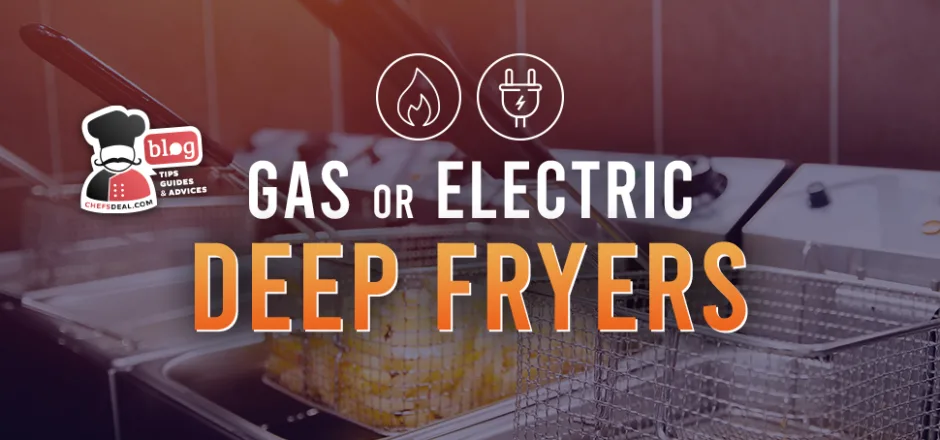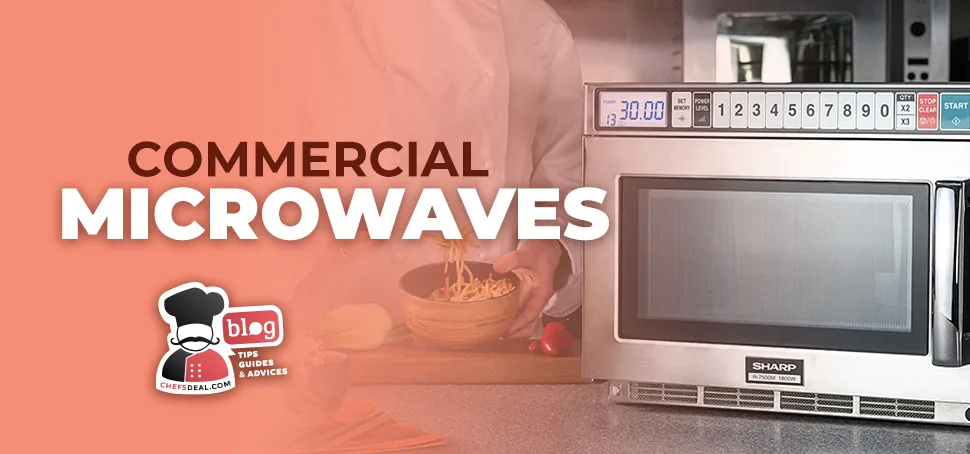Thank God it is FRY Day again. Every day is a fry day for American consumers and foodservice operators because fried foods taste, look, and smell great. The sight of the brown crust, the sound of the crunch of a bite, and the texture of crispy-outside-soft-inside make the fried dishes the most iconic menu items. All you need for such mouthwatering flavors is a commercial deep fryer. However, you should first answer a critical question: which is better, gas or electric deep fryers?
Energy Efficiency of Gas or Electric Deep Fryers – What & Why
The gas or electric deep fryers debate is not a new one. Although professional and home chefs, restaurant operators, and manufacturers have much to say about the question, most discussions end with a similar conclusion: it is a matter of preference. Yes, it is once and for all, particularly for residential users. However, for commercial kitchens, the right answer to the electric fryer vs. gas fryer issue ultimately comes down to the same point: energy efficiency.
Foodservice operation is a profitable but costly business. Equipment, ingredients, tax, utility, and labor costs amount to considerable money. Therefore, even the slightest reduction in expenses can make a difference. When choosing a gas or electric deep fryer, you should first and foremost ask which is more efficient. ENERGY STAR defines energy-efficient cooking equipment as one that “helps cafe, restaurant, and institutional kitchens save energy by cutting utility and maintenance costs without sacrificing features, quality, or style.” Here are the pillars of efficiency based on this definition:
1. Cooking Speed – Heat Up & Recovery Times
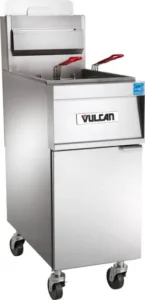
Faster cooking means more batches and servings, which contribute to higher income. The first thing you do when you open your eatery is to turn on your deep fryer. The ABC of frying is extremely hot oil. Therefore, the fryer must reach high temperatures for the first fry cycle. The faster the oil temperature rises, the earlier you start cooking and serving. Do gas or electric deep fryers heat up more quickly?
Gas is known to generate instant intense power through flames, triggering the heating process immediately. The moment a gas pilot ignites flames, the oil in the fry pot begins warming up. There must be a powerful and continuous energy source during this process for the oil to reach extreme temperatures as fast as possible. That’s why more energy consumption happens at this time than during frying. So, gas deep fryers are the winners of the gas or electric deep fryers battle on this front.
When the first batch is done, your fryer will be in standby mode, and the hot oil will slowly cool down. The time it takes for the fat to reach the frying temperatures for a new fry cycle is known as recovery time. Why is it crucial to ask whether gas or electric deep fryers recover heat faster? As this interval gets longer, service will be sluggish. Or if you start frying before the oil returns to its extreme heat, products will absorb more fat.
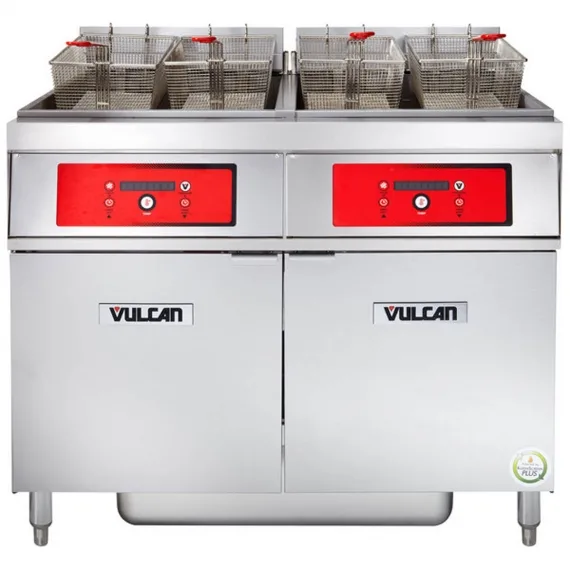
Therefore, if you want your gas or electric deep fryer to cook the same crispy texture at each batch, it should restore oil heat quickly. Frying at the same fat temperatures in subsequent fry cycles prevents the products from boiling. Minimal recovery times also mean less energy consumption. Electric deep fryers have the heating elements submerged in the fry pot, directly contacting the oil, so they outperform gas fryers in temperature recovery time.
2. Cooking Volumes
Production capacity is always a key point in buying cooking equipment. Operators want appliances that will meet the daily demands in their establishments. In gas or electric deep fryers, cooking volumes are often measured by the pound of oil the fry tank holds. Roughly, 1.5 to 2 times the fat capacity gives you the hourly production rate. For instance, a deep fryer with an 80-pound fat capacity can deliver 120 to 160 pounds of fried foods per hour. A poor size calculation means failure to pace up back-to-back orders.
Gas is a more powerful fuel type than gentler electricity. Oil temperatures in gas deep fryers get much higher quickly, leading to a crispier finish and faster cooking. When you are in the market browsing gas or electric deep fryers, you will notice that manufacturers often prefer gas on heavy-duty freestanding models and electricity on countertop units. The higher maximum oil temperatures due to more powerful gas energy make gas fryers more efficient in cooking larger batches.
3. Buying Price
Are gas or electric deep fryers more expensive? Gas fryers usually cost more than electric ones, primarily because they are more complex. Security is a hot issue in gas appliances regulated by strict safety codes. Compared to electric deep fryers’ design and construction simplicity, gas fryers must have additional pipes, connections, and gas cut-out valves, which add to their price. Thus, the point in price-wise gas fryer vs. electric fryer comparison goes to the electric fryers.
4. Technical & Operational Costs
The cost of ownership is more than just the purchase price. It includes all the expenses required for installing and running a piece of equipment. Accordingly, you must evaluate the extra dollars for using a gas or electric deep fryer. Gas fryers are technically more sophisticated with gas interlock systems, pipes, connections, and the like to comply with safety regulations. All those mean additional expenditures. Plus, if you do not have an existing gas line in your facility, you might need updates for a gas hookup.
Electric fryers are a plug-and-go type of equipment. Since electricity is the typical power source everywhere, installing an electric deep fryer causes no extra bucks. With fewer moving parts, electric fryers are easier to clean. Maintenance can also play a role in your choice of gas or electric deep fryer because about 70% of energy waste in commercial kitchens is due to insufficient maintenance. Regular upkeep improves performance, extends your equipment’s life, and helps save energy. Electric fryers are more cost-effective, with fewer maintenance and repair costs.
5. Mobility
Mobile cooking equipment has the benefit of flexibility. Easily moving around appliances in your kitchen can improve your workflow. Since electric outlets are everywhere, you can plug in and use your electric fryer anywhere in the kitchen. Gas fryers are also portable with LP gas tanks, providing great convenience, particularly when catering outdoor events. Therefore, the portability of gas or electric deep fryers is equal.
6. Greenness
It is everybody’s responsibility to preserve natural sources for a better future. Manufacturers constantly innovate to contribute to energy conservation as part of their green initiatives. Besides, greener equipment consumes less energy, so eco-friendliness is an integral constituent of efficiency. Are gas or electric deep fryers greener? The answer is electric fryers. As the electric heating elements directly warm the oil, you do not have to worry about excess heat. The intense heat from gas fryers adds to the ambient temperatures, putting strain on your HVAC system. Also, electricity has a smaller carbon footprint than gas.
7. Safety
There is an entrenched belief that electricity is safer than gas. This belief has merit, given that gas leak is always a serious concern in commercial or residential kitchens. That’s why installing and maintaining a gas deep fryer can be more costly with proper ventilation, auto shutoff, and fire suppression systems. However, technological innovations have equipped gas fryers with great safety features. Hence, both gas and electric deep fryers are equally safe.
8. Utility Costs
Your gas or electric deep fryer must not inflate the utility bills since you already allot dollars to many other expenses in running a restaurant. Although the prices are volatile and vary across states, gas is cheaper on average than electricity. Plus, the powerful energy generated by gas deep fryers can boost your production rates. The ability to serve more with less energy is what every operator wants.
9. Taste
There is little difference in the taste of food fried in a gas or electric deep fryer. The taste mostly depends on the quality of the oil and food item. The crisp texture comes from the oil temperatures and fast recovery times. There might be a slight difference in the color of the fried food, but not the actual flavor. A nuisance with gas fryers is that they produce heavier carbonization in the oil. Still, as long as you regularly filter the oil and clean your fryer, that won’t be an issue. So, electric vs. gas deep fryer bears no noticeable difference in flavor.
Scoring Gas or Electric Deep Fryers on Efficiency Measures
Let’s assign one point for gas or electric deep fryers’ strengths on various efficiency measures. You can thus see a summary of the discussion and an overall efficiency score to better inform your electric deep fryer vs. gas deep fryer decision.
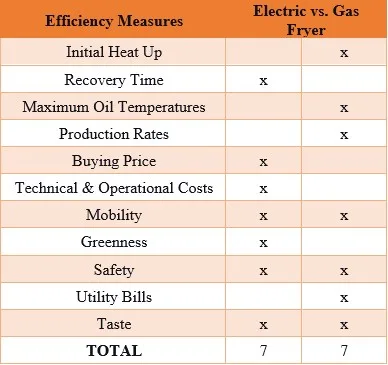
The comparison reveals that deep fryer gas and electric models have the same overall efficiency score. Then, you can match your business type and traffic with your unique gas or electric fryer comparison. After all, there is not a fit-for-all piece of equipment.
When To Prefer Gas Or Electric Deep Fryer
Not all commercial kitchens expect the same output from their gas or electric deep fryers. High-volume restaurants can benefit from the large capacities of gas floor fryers for a more efficient operation. Their tanks can hold up to 130 pounds of fat; the hourly production from a multiple-battery unit with each tank having that much oil capacity can meet the peak demands. Your output approximates 260 pounds of fried products in such a scenario.
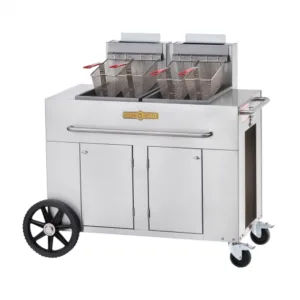
Such a high-capacity fryer may break the bank for smaller establishments with low to medium-volume requirements. Remember the gas or electric deep fryer comparison by the upfront and operational costs point. Since electric fryers are more affordable to buy and maintain, low-volume facilities can prefer countertop electric deep fryers, which will also maximize their space efficiency. With the plug-and-play convenience and smaller footprint, these units would be ideal for food trucks, pop-up restaurants, cafeterias, fast-food outlets, or on-the-go kitchens.
Fried recipes are also the staples of catered events to appease crowds’ hunger and appetite. Frying food in large volumes and transporting them to event venues is an extra hassle and budget. Can gas or electric deep fryers solve this problem for caterers? Outdoor gas fryers are designed specifically to serve guests on special occasions. They are self-contained and portable units with LP gas tanks. You can carry and use them even when a natural gas line is not accessible.
A Final Solution To Gas Or Electric Deep Fryer Debate
There might not be a definitive answer to the long-lasting gas vs. electric deep fryer discussion when each has certain pros and cons. You can ask a different question promising more fruitful results: how to make gas or electric deep fryers more energy efficient? Looking for Energy Star labels can make a huge difference in efficiency. Energy Star-certified gas and electric deep fryers are around more efficient than standard, saving up on annual utility bills. Therefore, when buying fryers, always watch for Energy Star certification.

